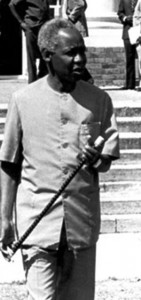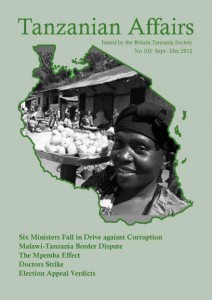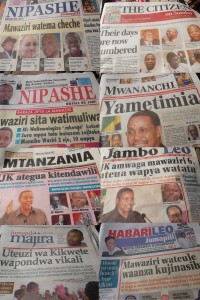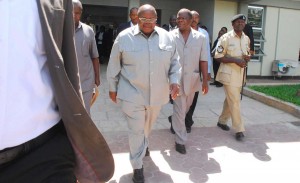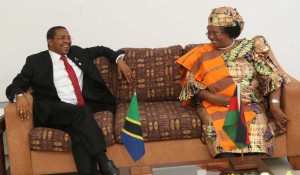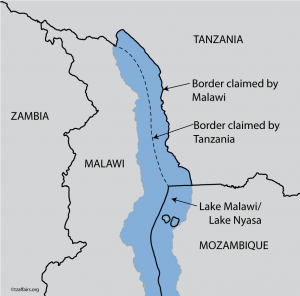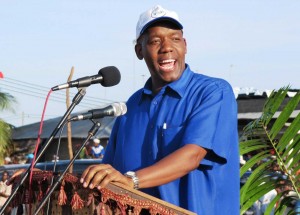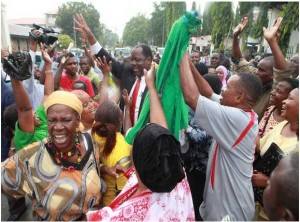by Donovan McGrath
Kicking them off their land
On 13 August 2012, the online campaign organisation Avaaz.org sent a global message over the internet saying: ‘Middle Eastern kings and princes are about to force up to 48,000 people in Tanzania from their land to make way for corporate sponsored big game hunting. But Tanzanian President Kikwete has shown before that he will stop deals like this when they generate negative press coverage.’ The online reader is then asked to ‘Click to deliver a media blitz that will push President Kikwete to stop the land grab and save these Maasai.’ – Habari (Sweden-Tanzania Society, Nr 3 2012). As at the beginning of December over 900,000 people have signed the online petition.
Malimu’s legacy: Socialism, restraint and fitness
In a well-written piece, journalist Elsie Eyakuze shares her thoughts on the build up to Nyerere Day. Extract: ‘…This month the Tanzanian media has seen an increase in Nyerere content. We’re about to commemorate Mwalimu on the 13th anniversary of his passing, in the fine tradition of deifying the founder of the nation…During the weeks building up to the day itself, the archives open wide and out flows a stream of footage of the first president. Black and white reels of historic visits to this or that country, with this or that revolutionary leader. There he is peering interestedly at a farm or factory, striding along and brandishing his baton. That baton! … Nyerere intuited that said people appreciate a little flash in a leader, some visual markers of his uniqueness. The short-sleeved socialist suit was his most fiendishly sly gift to the political class. A slim man, Nyerere managed to choose a style of clothing that was entirely hostile to excess and the potbellies it generates… Socialism, restraint and fitness have never had a better meeting ground.
The best material, of course is made up of Nyerere’s public addresses. This is the age of 30-second attention spans, when grand oratory has fallen out of fashion. But Mwalimu found a way around this limitation: he was a quipper… What is hard to explain is how this great man of another era manages to remain genuinely popular today. The majority of Tanzanians living now were born long after he gave up the reins of power. His economic policy was a disaster that we’re still recovering from, and there are things about the Ujamaa villagisation exercise, among other initiatives, that do not reflect well on Mwalimu. And yet here we are, continually riffling through the stacks of material he left behind whenever we are in need of clarity about Tanzanian politics and other things more universal. Why? Maybe it was the simplicity of his era that allowed him to develop a leadership style that was distilled and potent. There were no opinion polls on his popularity to confuse matters, no investigative journalists, none of the screeching catfights of a nascent multiparty democracy. Things moved slowly then, so speeches could be written and delivered that had deep thought behind them, not just bullet points and key words. Leadership had to be demonstrated consistently, and courage probably still had a place in policy-making. And, of course, the scale of ambition in political life was entirely different: Rather than simply looking to survive another election it was possible to pursue the really big visions, like dignity or integrity or self-reliance. We don’t make them like that anymore, and clearly we wished we did. Happy Nyerere Day.’– East African (October 13-19, 2012).
Tanzania’s invisible web revolution
‘East African governments are in the grip of internet fever. They have built thousands of miles of fibre-optic cable and intend to connect even the most remote villages to super-fast broadband. So is the web really transforming lives?’ Extract continues: ‘… Tanzania borrowed $170m (£105m) from the Chinese government and raised a further $80m to build a vast fibre-optic cable network, stretching 7,500km (4,600 miles) in a ring around the country. It hopes to transform Tanzania into a tech powerhouse to rival its neighbour Kenya, which built a smaller network more quickly and is already regarded as the regional hub for technology.
But there are already worrying signs for the government. The people of Bagamoyo are concerned that the government is doing too little to promote its vision. Rehema Nzige, who teaches Information and Communications Technology (ICT) at Bagamoyo’s Institute of Arts and Culture, says she has heard little about the new broadband network… The lack of engagement is partly because the internet is intangible, and the work to build the new infrastructure has largely involved burying cables in remote areas away from the cities. It is a quiet, invisible revolution, but its effects are definitely beginning to be felt in Bagamoyo, where trade in cheap Chinese smart phones is booming, and internet cafes are starting to struggle. “People used to come to check their mail, Facebook and the like,” says Mahbub Nurdin Faqi, who runs the Sunrise web cafe. “But now everything is on the phones. People only really come to our cafe to print out an attachment or to send a document.”… The first undersea cable arrived only in 2009, so it is an impressive feat of engineering – carried out by Chinese firm Huawei – to have laid so much cable… “Communication is everywhere in Tanzania,” says Science Minister Makame Mbarawa. “All mobile phones around here have the internet. Villagers are using the internet and their phones to find out the price of things at the market before they even set out. Farmers are using the internet to plan better for what weather is coming.” Phones apps have been developed to help farmers, but it is hard to judge how successful they will be. Mr Mbarawa raises an important point about the internet in Tanzania. It is almost exclusively mobile, fixed lines connected to homes hardly exist… What the government really wants is to connect all schools, colleges and universities, and create scientific research centres and modern public libraries. It wants hospitals and health centres linked up, and wants to bring cheap, quick internet connections to everyone in Tanzania… A tall order for a country that still ranks among the world’s poorest… [S]o far the real revolution is largely limited to the cities…’ – BBC News Africa (online 2 October 2012) Thank you Tim Watkins-Idle for this article – Editor.
The world goes to Bagamoyo
A festival that began under a mango tree now draws international participants to the newly-built multi-million shilling theatre at Bagamoyo. Extract: ‘Cultural groups from across Africa and Europe gathered at the Taasisi ya Sanaa na Utamaduni (Bagamoyo Institute of Arts and Culture, known as Tasuba) from September 24 to 29. Participants showcased traditional dance and music performances, acrobatics, exhibitions and workshops. The one-week event is the biggest arts festival in Africa… With cultural groups from Kenya, Malawi, France, Zambia, Sweden, Democratic Republic of Congo (DRC), Denmark, Uganda, Norway, Ethiopia, South Africa and local traditional cultural groups, the festival drew large audiences. This year, Tasuba … chose the theme “Arts for Promoting Tourism.” The festival dates back to the early days of the Bagamoyo College of Arts, when it was established to display the works of the students and teachers at the institution.
Since the event started in 1982, the festival has grown to an annual one-week event … Due to the lack of sponsorship, the institute says it would like people from the community to take part in the festival and help create a heritage that includes African, Arab, Latino and European culture.’– East African (October 6-12, 2012).
Zanzibar refugees back
Extract: ‘Thirty-eight Zanzibaris who fled political violence in 2001 and spent a decade in Dadaab refugee camp in Kenya returned home . . .’ Special humanitarian flights were organised by the UN. ‘However, scores of relatives and friends who turned up at [Zanzibar Airport] were disappointed as tight security and protocols prevented them from meeting their loved ones immediately upon their arrival. . . More than 2,000 supporters of the opposition Civic United Front (CUF) fled Zanzibar at the height of post-election violence in 2001, with many seeking refuge in Kenya, where they lived in Dadaab, the world’s largest refugee camp.’ – Habari (Sweden-Tanzania Society, Nr 3 2012).
Tanzania completes population census
Extract: ‘The Tanzanian government has projected that the just concluded census will show a 33 per cent increase in population since the last count 10 years ago. An official at the National Bureau of Statistics (NBS) told The East African that the country probably has 45 million people, compared with 34 million in 2002… Tanzania conducts a census every 10 years, but this has not been regular due to financial constraints. The country held its first national population census in 1967. There have been mixed reactions with some people refusing to be counted … Some people have already been taken to court for refusing to be counted… The seven-day census was conducted throughout the country, and President Jakaya Kikwete had urged people to stay at home and be counted.’ – East African (September 1-7, 2012).
British tourist, 61, stung to death by swarm of bees on holiday in Tanzania
Extract: ‘A British tourist holidaying in Africa has been stung to death by a swarm of bees. Mick Bryan, 61, and his 43-year-old wife Jacqueline were attacked at a campsite in Tanzania. The couple, from Ramsey in Cambridgeshire, were about to have lunch when the swarm descended and started to sting them. Mrs Bryan ran for help but her mechanic husband … collapsed and died later in hospital…’– Daily Mail (online 25 January 2012).
National parks and wildlife under threat from global climate change
The photograph accompanying this article shows hippos and flamingos scratching around in a wide dry area of Lake Manyara. Extract: ‘…The water depth of Lake Manyara, which makes up two-thirds of Manyara National Park, has shrunk by 200 times since 1920 due to persistent drought, threatening the survival of the park. Lake Manyara National Park attracts over 100,000 tourists per year, nearly 10 per cent of Tanzania’s annual tourists. Yustina Kiwango, Lake Manyara National Park Ecologist, said that initially the lake’s depth averaged six metres but lately the water’s depth has been at just 0.3 metres, a twentieth of its original depth… Allan Kijazi, director general of Tanzania National Parks, told The East African the authority is building dams and drilling boreholes in the national parks to provide additional water sources for the animals. Mr Kijazi said that the other national parks hard hit by global warming are Serengeti, Mkomazi, Mikumi and Saadani … Conservationists are worried about the survival of wild animals, saying if the situation continues, the country faces losing its wildlife, which will adversely affect tourism.’– East African (October 6-12, 2012).
Big Hitter: First Afghan Champ
Extract: ‘Afghan Hamid Rahimi celebrates after winning the first professional men’s boxing match ever in the country. Rahimi beat Tanzanian Said Mbelwa in Kabul for the WBO intercontinental middleweight belt.’– Times.
Walk This Way
The following is taken from an interview by Aboubakar Omar Famau, who speaks to retired diplomat Walter Bugoya, a confidante of former Tanzanian President Julius Nyerere, about Tanzania’s ‘second independence’. Extract: During the period of the Arusha Declaration (1967), Walter Bugoya was a civil servant who was also involved in the party (TANU). Mr Bugoya described Nyerere’s mood on the day of the declaration: ‘… he was at his best. Of course he was a fantastic speaker… he also had a fantastic sense of humour and people were just mesmerised, because also these were the preoccupations of the people.’ Bugoya’s most vivid memory was of Nyerere’s speech at Mnazi Mmoja ground…’ it must have started at about 4pm, but we had all been gathered there for three hours before. Nyerere began as a typical teacher, explaining the background of the declaration – where we had come from, the developments that we had made and why this was now the declaration upon which we were going to build a society of equal people. After the declaration – I think the speech ended at 7pm – the banks were taken over, they were nationalised…..All the banks were surrounded by the military and for some of us who were very excited we thought: “Oh … there you are, this is fantastic, we are taking over.” … there were massive demonstrations across the country supporting the declaration. And it went on for, gosh, years – us discussing the declaration… this was the new independence… Before, independence was basically the end of colonial occupation.’ Asked if the state had enough money to invest on behalf of the people, Bugoya said, ‘The state could borrow from different sources… Don’t forget the world then was divided basically into two camps: socialist and capitalist… the socialist economy seemed to us more rational. That is why the Arusha Declaration was drafted. It was our blueprint for building a socialist society.’ When asked how important the Arusha Declaration was to the history of Tanzania, Bugoya said, ‘It was extremely important. It changed the mind-set of our people. Even today, so many years afterwards, attempts to kill the declaration amount to nothing.’ The retired diplomat thought it was a good question when he was asked if the declaration had done what it should have for the Tanzanian people: ‘There are some people in this society who think it did more harm than good. I don’t share that opinion at all. I think that the declaration was the basis of the society. Whether one was rich or poor, one felt free and did not fear leaders- and you even had a certain degree of gender equality.’ The final question was if the interviewee had ever heard Nyerere admit that the declaration did not work. Bugoya, who was a close associate of Nyerere and his one-time speech writer, replied: ‘No, no. If you look at the statement Nyerere made ten years later, he admitted that mistakes had taken place and he was aware of the shortcomings of socialism. But he did not agree that socialism had failed. In fact, I would argue that how could socialism have failed when it never actually happened in the first place?’ -BBC Focus On Africa (October-December 2012).
Peter Andre visits Zanzibar
Extract: ‘After a chance meeting between Peter Andre and the chairman of Health Improvement Project Zanzibar, the Mysterious Girl singer agreed to get behind the charitable cause. The two men have been visiting Zanzibar together so that Peter can see the project and the difference it makes to the 60,000 residents. Naturally, the tanned singer took along his TV crew to film his good work for his ITV2 show Peter Andre: My Life… The first image that he posted was of him sitting with four children outside an orphanage. He said: “Here I am in Zanzibar working with my friend Dr Ru. We WILL make a difference”. . He posted a picture of himself in a hospital and said: “One of the many malaria infected children I have met in Zanzibar … Emotional but incredibly rewarding.” Whilst on the island Peter made time to stop at one of his idols homes as he stood outside the house that Freddie Mercury once lived in. The former Queen front man was born in Zanzibar and raised in that house until his family moved to India… He said: “Loving Zanzibar. Visiting a school in Makunduchi. One of best days ever today”. — Daily Mail (online 8 February 2012).
The self-destructing syringe
According to the World Health Organisation, 1.3 million people a year die because of the re-use of syringes. A British designer aims to change that and he has produced a video, distributed by the charity SafePoint, which highlights the campaign by the British inventor of the ‘auto-disable syringe. He writes in the British Guardian as follows:
Tanzania is to become the first country in the world to move exclusively to using syringes that self-destruct. Marc Koska, the designer, went to the Tanzanian Minister of Health to show her a video of a nurse injecting a man who had HIV and syphilis with antibiotics – and then reusing the needle on a one-year-old baby… She was distraught and said: “What are we talking about here? What’s the solution? Let’s get on with it.” A meeting scheduled for 10 minutes went on for two hours.
Koska went to the ministry with figures and explained that the clearest evidence of danger is the gap between the numbers of injections and the numbers of imported needles. “Tanzania has 45 million people and they are importing 40m syringes. With an average of five injections each a year, they need 220m,” he said. “This is not about routine childhood immunisation, for which safe syringes such as Koska’s are provided along with the vaccines, usually by Unicef, the biggest procurer.” But “they forgot the other 90%”, he said. To put it in his own colourful terms, “no one gave a rat’s arse” about what happened to children after the immunisations. In developing countries, treatment is often by injection rather than pills. “The village quack has one syringe for 200 people,” he said. “I’ve seen him take it out of his hair, use it and then stick it back in the roof of the hut where the insects are. The healthy start to life that children are given is so easily undermined.” He went on: “There is a commercial conundrum at the heart of the problem. At 3p each, syringes are very cheap to make. They are manufactured by a small number of big companies which use them as a loss leader – they package the syringes together with blood bags or catheters and charge more. Although auto-disable syringes are now as cheap to make, it involves changing over the production process, which is expensive. Companies also sell fewer syringes in the long run – because people get well.” Koska has his own company, but his charity supports the use of any quality-assured brand of auto-disable syringe. Koska hopes to persuade families to demand safe injections from needles carrying a LifeSaver kitemark. In Tanzania, health workers will ask people given such injections to send a free text to the health ministry. Health workers who get 500 text “votes” receive congratulations and a status-conveying badge. Koska tells of seeing parents asked to choose the needle to be used on their child from a tray of reused ones. If families understood the danger, they would insist on a new one. Twenty-seven years ago Koska was kicking his heels in the Caribbean after a privileged upbringing, looking for something interesting to do with his life. “I had first-class honours in beach bumming,” he said. “Then in May 1984, I read an article – in the Guardian as it happened – predicting that in the future syringes would be a major transmission route for HIV. Immediately I knew that was my calling.” It took years of studying the problem and learning about plastics, before he hit on his design, in which the plunger breaks as soon as it is pulled back for reuse. He has now sold 3 billion of them and recently he finally signed a contract with the world’s biggest syringe-maker to produce his auto-disable design. Thank you Julian Marcus for sending this item – Editor.

